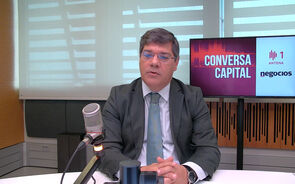FED deixa taxa de juro dos Estados Unidos nos 1,25%
4 mensagens
|Página 1 de 1
Andrade
o GreenMan bem quer enviar uma mensagem "não assustadora", para depois não o culparem de colocar água na fogueira (mercados)agora que esta começava a atear... Mas digamos que por lá e por cá a coisa está mais numa perspectiva preocupante e não numa animadora... mas é esta última que impera neste momento...e contra estampidas bull.. é segui-las até acalmarem.
Cump.
Cump.
-
Info
Recuperação económica
E se essa recuperação não aparecer??????????
Aqui vai um economista que adoro ler: Jim Puplava
Todos os dias um artigo interessante. Apesar de se repetir muito.
Artigo de ontem:
http://www.financialsense.com/Market/daily/monday.htm
um abraço a todos
andrade
Aqui vai um economista que adoro ler: Jim Puplava
Todos os dias um artigo interessante. Apesar de se repetir muito.
Artigo de ontem:
http://www.financialsense.com/Market/daily/monday.htm
um abraço a todos
andrade
- Mensagens: 1330
- Registado: 12/11/2002 16:18
- Localização: Santarém
cá vai mais info sobre isso:
Fed warns of weakness, deflation - FOMC has faith in economy, but demands proof
By Rex Nutting, CBS.MarketWatch.com
Last Update: 2:20 PM ET May 6, 2003
WASHINGTON (CBS.MW) -- The Federal Reserve has faith that the sluggish U.S. economy will work its way out this persistent slump, but policymakers stand ready to stoke the furnace if growth fades again.
As expected, the Federal Open Market Committee held its target federal funds rate steady at a 41-year low of 1.25 percent following Tuesday's meeting. The vote was unanimous.
The FOMC signaled that conditions are ripe for a significant acceleration in economic growth, although the timing and extent of the recovery are still uncertain.
At the same time, the committee said it sees the risks to the economy tilted toward weaker growth, meaning the committee could be ready to cut rates if business confidence doesn't recover quickly.
"The probability of an unwelcome substantial fall in inflation, though minor, exceeds that of a pickup in inflation from its already low level," the FOMC said. It's the first time the FOMC has mentioned the threat of deflation in its statements.
At its March meeting, the FOMC had said it could not usefully assess the risks, given the fog of war.
Still, the Fed remains optimistic over the long run.
"The ebbing of geopolitical tensions as rolled back oil prices, bolstered consumer confidence and strengthened debt and equity markets," the Fed said.
"These developments along with the accommodative stance of monetary policy and ongoing growth in productivity, should foster an improving economic climate over time," the statement said.
Although the FOMC remains optimistic about the economy, it could not ignore recent evidence on the economy that shows the business sector remains extremely reluctant to commit to new spending on capital or labor.
In the meantime, the consumer sector and the housing market show signs of leveling off. Gains in federal government spending are more than offsetting a severe drop in state and local spending.
Confidence builders
But now that energy prices have retreated and Saddam Hussein has been deposed, business confidence should return, Fed policymakers have said in recent weeks.
A week ago, Fed Chairman Alan Greenspan showed where he stood in testimony on Capitol Hill: "I continue to believe the economy is positioned to expand at a noticeably better pace than it has during the past year, though the timing and the extent of that improvement remains uncertain."
But Greenspan acknowledged that the Fed is mindful that its rosy forecast might not play out.
"Unfortunately, the future path of the economy is likely to come into sharper focus only gradually," Greenspan said. "In the interim, we need to remain mindful of the possibility that lingering business caution could be an impediment to improved economic performance."
Policymakers have pointed to recent increases in the stock market and in new orders for capital equipment to justify their faith that the end of the war means a return to growth.
The prospect of another tax cut could also stimulate both spending and investment.
The FOMC has cut rates 12 times since January 2001 in a largely successful effort to blunt the impact of the bursting of the investment bubble of the 1990s.
Interest rates have plunged for home mortgages and auto loans, maintaining a healthy pace of consumer spending. Spending by businesses, however, has not yet recovered from the bust.
Severe cost-cutting by companies continues as they strive to improve their profits and repair distorted balance sheets. Employment has fallen for three months in a row and the official unemployment rate has risen to a cyclical high of 6 percent.
Deflation
Although the FOMC seems confident that the economy will turn around and that more jobs will be created, policymakers are voicing a new concern: Deflation.
"With price inflation already at a low level, substantial further disinflation would be an unwelcome development," Greenspan said last week.
For the first time, a Fed chairman has told us that the central bank might have to act to make sure prices don't fall.
Even if growth resumes, the FOMC might find it necessary to cut rates again or to take other actions to increase the money supply to prevent prices from falling.
By Rex Nutting, CBS.MarketWatch.com
Last Update: 2:20 PM ET May 6, 2003
WASHINGTON (CBS.MW) -- The Federal Reserve has faith that the sluggish U.S. economy will work its way out this persistent slump, but policymakers stand ready to stoke the furnace if growth fades again.
As expected, the Federal Open Market Committee held its target federal funds rate steady at a 41-year low of 1.25 percent following Tuesday's meeting. The vote was unanimous.
The FOMC signaled that conditions are ripe for a significant acceleration in economic growth, although the timing and extent of the recovery are still uncertain.
At the same time, the committee said it sees the risks to the economy tilted toward weaker growth, meaning the committee could be ready to cut rates if business confidence doesn't recover quickly.
"The probability of an unwelcome substantial fall in inflation, though minor, exceeds that of a pickup in inflation from its already low level," the FOMC said. It's the first time the FOMC has mentioned the threat of deflation in its statements.
At its March meeting, the FOMC had said it could not usefully assess the risks, given the fog of war.
Still, the Fed remains optimistic over the long run.
"The ebbing of geopolitical tensions as rolled back oil prices, bolstered consumer confidence and strengthened debt and equity markets," the Fed said.
"These developments along with the accommodative stance of monetary policy and ongoing growth in productivity, should foster an improving economic climate over time," the statement said.
Although the FOMC remains optimistic about the economy, it could not ignore recent evidence on the economy that shows the business sector remains extremely reluctant to commit to new spending on capital or labor.
In the meantime, the consumer sector and the housing market show signs of leveling off. Gains in federal government spending are more than offsetting a severe drop in state and local spending.
Confidence builders
But now that energy prices have retreated and Saddam Hussein has been deposed, business confidence should return, Fed policymakers have said in recent weeks.
A week ago, Fed Chairman Alan Greenspan showed where he stood in testimony on Capitol Hill: "I continue to believe the economy is positioned to expand at a noticeably better pace than it has during the past year, though the timing and the extent of that improvement remains uncertain."
But Greenspan acknowledged that the Fed is mindful that its rosy forecast might not play out.
"Unfortunately, the future path of the economy is likely to come into sharper focus only gradually," Greenspan said. "In the interim, we need to remain mindful of the possibility that lingering business caution could be an impediment to improved economic performance."
Policymakers have pointed to recent increases in the stock market and in new orders for capital equipment to justify their faith that the end of the war means a return to growth.
The prospect of another tax cut could also stimulate both spending and investment.
The FOMC has cut rates 12 times since January 2001 in a largely successful effort to blunt the impact of the bursting of the investment bubble of the 1990s.
Interest rates have plunged for home mortgages and auto loans, maintaining a healthy pace of consumer spending. Spending by businesses, however, has not yet recovered from the bust.
Severe cost-cutting by companies continues as they strive to improve their profits and repair distorted balance sheets. Employment has fallen for three months in a row and the official unemployment rate has risen to a cyclical high of 6 percent.
Deflation
Although the FOMC seems confident that the economy will turn around and that more jobs will be created, policymakers are voicing a new concern: Deflation.
"With price inflation already at a low level, substantial further disinflation would be an unwelcome development," Greenspan said last week.
For the first time, a Fed chairman has told us that the central bank might have to act to make sure prices don't fall.
Even if growth resumes, the FOMC might find it necessary to cut rates again or to take other actions to increase the money supply to prevent prices from falling.
-
Info
FED deixa taxa de juro dos Estados Unidos nos 1,25%
FED deixa taxa de juro dos Estados Unidos nos 1,25%
Terça, 6 Mai 2003 19:16
A Reserva Federal dos Estados Unidos decidiu deixar a taxa de juro inalterada nos 1,25%, o valor mais baixo dos últimos 41 anos, dadas as expectativas de recuperação da maior economia do mundo no resto do ano.
A decisão já era aguardada pelos analistas, depois de Alan Greenspan ter dito na semana passada que a economia dos Estados Unidos vai crescer a um ritmo muito superior, dado ter terminado a guerra no Iraque.
Dado o valor historicamente baixo das taxas de juro a FED também não tem muita margem de manobra para acelerar o crescimento da economia com a política monetária. As taxas de juro nos Estados Unidos são metade das registadas na Europa, onde o BCE também deve optar por deixar o custo do dinheiro nos 2,5% na quinta-feira.
Depois de crescer 4% no terceiro trimestre de 2002 a economia americana, que esteve em recessão em 2001, abrandou o seu crescimento. Nos últimos três meses de 2002 o PIB aumentou 1,4% e no primeiro trimestre deste ano cresceu 1,6%, abaixo do esperado pelos analistas.
Os responsáveis da FED consideram que o actual nível das taxas de juro são suficientes para suportar o crescimento da economia.
por Nuno Carregueiro
Terça, 6 Mai 2003 19:16
A Reserva Federal dos Estados Unidos decidiu deixar a taxa de juro inalterada nos 1,25%, o valor mais baixo dos últimos 41 anos, dadas as expectativas de recuperação da maior economia do mundo no resto do ano.
A decisão já era aguardada pelos analistas, depois de Alan Greenspan ter dito na semana passada que a economia dos Estados Unidos vai crescer a um ritmo muito superior, dado ter terminado a guerra no Iraque.
Dado o valor historicamente baixo das taxas de juro a FED também não tem muita margem de manobra para acelerar o crescimento da economia com a política monetária. As taxas de juro nos Estados Unidos são metade das registadas na Europa, onde o BCE também deve optar por deixar o custo do dinheiro nos 2,5% na quinta-feira.
Depois de crescer 4% no terceiro trimestre de 2002 a economia americana, que esteve em recessão em 2001, abrandou o seu crescimento. Nos últimos três meses de 2002 o PIB aumentou 1,4% e no primeiro trimestre deste ano cresceu 1,6%, abaixo do esperado pelos analistas.
Os responsáveis da FED consideram que o actual nível das taxas de juro são suficientes para suportar o crescimento da economia.
por Nuno Carregueiro
- Mensagens: 23939
- Registado: 5/11/2002 11:30
- Localização: 4
4 mensagens
|Página 1 de 1
Quem está ligado:
Utilizadores a ver este Fórum: aaugustobb_69, Bing [Bot] e 206 visitantes


